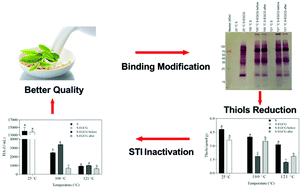Green tea polyphenols bind to soy proteins and decrease the activity of soybean trypsin inhibitors (STIs) in heated soymilk
Abstract
The interaction between epigallocatechin gallate (EGCG) and soy proteins at room temperature (25 °C) and after heating at 100 and 121 °C, and their effects on the inactivation of soybean trypsin inhibitors (STIs) in soymilk were investigated. The results of the nitroblue tetrazolium (NBT) staining assay showed that soy proteins can covalently bind to EGCG. The α/α′ and A subunits in heated soymilk preferred to bind to EGCG because of their soluble state. More thiols were trapped when EGCG was added before thermal processing, and the free amino groups were depleted more with EGCG addition after heating. Circular dichroism and fluorescence spectroscopy showed that EGCG addition before or after heating induced different secondary and tertiary structural changes for soy proteins. The exposed aromatic amino acids preferred to react with EGCG before protein aggregation in the heating process. The random coil of soymilk proteins increased more when EGCG was added in soymilk after heating, resulting in more disordered structures in protein conformation. The binding between EGCG and soy proteins promoted protein aggregation, which was confirmed by the particle size distribution and gel electrophoresis. The trypsin and chymotrypsin inhibitory activity (TIA and CIA) in soymilk significantly reduced to 693 U mL−1 and 613 U mL−1, respectively, under the conditions of 2 mM EGCG addition after 100 °C heating for 10 min (p < 0.05). Consequently, the influence of EGCG on STI inactivation in soymilk only worked when EGCG was added after heating.



 Please wait while we load your content...
Please wait while we load your content...